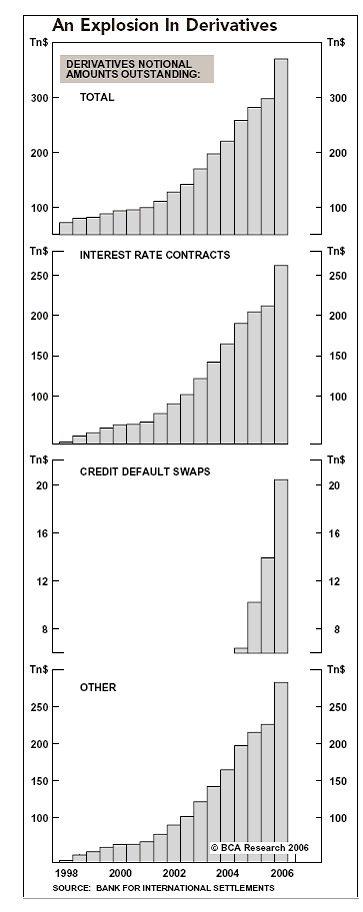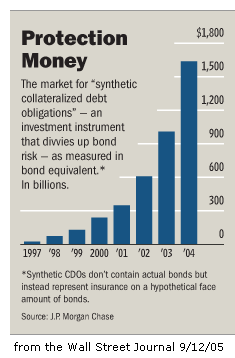

|
| weblog/wEssays archives | home | |
|
Sub-Prime Meltdown and the Derivatives Fiasco To Come (March 22, 2007)  This is a tall order, but I'm going to try to explain how the sub-prime meltdown will
trigger a fiasco in the $360 trillion global derivatives market--with unknown consequences.
This is a tall order, but I'm going to try to explain how the sub-prime meltdown will
trigger a fiasco in the $360 trillion global derivatives market--with unknown consequences.
You experts out there may find some fault in my simplifications, and I do not claim to be anything but an interested amateur. But since the coming derivatives fiasco will affect us all one way or another (your 401K blowing up, your pension fund blowing up, etc.), then it behooves us to try to understand a purposefully obscure and arcane subject. For a window into the making and marketing of derivatives, please read the book Fiasco: The Inside Story of a Wall Street Trader For a description of the mortgage derivatives market, I recommend Barrons Just How Sub Is Subprime? (good explanation of mortgage derivatives). Here's how it works. Let's say you're an "investment" banker type (little inside joke there--"investment," hahahahaha) and you've been offered some real garbage sub-prime mortgages--the real toxic stuff that everybody knows will go into default sooner or later. Hmm, this presents a problem, doesn't it? Who will be dumb enough to buy a loan which is destined to blow up and vaporize a big chunk of assets? How about a big dumb insurance company, state pension fund or non-U.S. yield-chasing behemoth in Japan, China or Europe? OK, so now that we have the mark (grifter-speak for sucker) in our sights, we need some serious lipstick to dress up the pig. Here's why we make millions, folks--because we're so danged smart! First, we get some AAA-rated mortgages--the gold standard stuff, 30-year fixed-rate from low-risk borrowers--and then we mix in some toxic sub-prime garbage into a "trust" which collects the principle payments into one income stream (called a tranch) and the interest payments in another. Now we get a credit rating outfit like Moodys to give the trust a AAA rating because hey, the majority of the mortgages packaged into the trust are AAA. (Another ploy is to get the principle rated AAA and leave the interest--which everyone knows will never be collected in full--unrated.) This is important because the marks--the pension funds, insurance companies, and bond funds-- can only buy AAA paper--at least on the books which are shown to investors.  Congratulations--we've created a residential mortgage-backed security (RMBS). Now the
real fun begins. Next, we create a CDO, a collateralized debt obligation, which buys
up whatever sub-prime, Alt-A or otherwise risky garbage mortgages we weren't able to palm
off in the RMBS. CDOs are credit based, of course, as are some spin-off derivatives called
Synthetic CDOs, which are synthetic because they have nothing to do at all with the
underlying debt (i.e. mortgages). Now we sell the CDOs to the marks because the yield is a point or two
(1% or 2%) higher than low-risk paper. And the marks are happy to buy. Why?
Congratulations--we've created a residential mortgage-backed security (RMBS). Now the
real fun begins. Next, we create a CDO, a collateralized debt obligation, which buys
up whatever sub-prime, Alt-A or otherwise risky garbage mortgages we weren't able to palm
off in the RMBS. CDOs are credit based, of course, as are some spin-off derivatives called
Synthetic CDOs, which are synthetic because they have nothing to do at all with the
underlying debt (i.e. mortgages). Now we sell the CDOs to the marks because the yield is a point or two
(1% or 2%) higher than low-risk paper. And the marks are happy to buy. Why?
Let's say you're the fund manager at a municipal or other public pension fund, either in the U.S. or elsewhere. All of you have the same problem globally--low yields on safe investments like U.S. T-Bills and other high-rated bonds. Most of your assets are in Treasuries and TIPS and low-yield corporate bonds--stuff paying 4%. Now you can buy something with a 6% yield, effectively raising the yield of your portfolio by 50%. Hey, you're now a superstar. Your managers love you--look at these returns! Wow, if we can keep this up, maybe our underfunded assets will actually keep ahead of our pay-outs. Our political bosses will love that because they can then divert tax dollars from the pension fund to their pet pork projects. Everybody wins. At least for a while. But we're not done making money off all the toxic garbage mortgages we packaged and sold. Now we sell you, our favorite marks, some derivatives to protect you from the risk we just sold you. Like a nice credit default swap: for a fat premium, you're protected against a default in the RMBS we just sold you. Buying some "insurance" against defaults looks smart, and we pocket a fat fee. But wait-- there's more. Since you can own derivatives "off balance sheet"--hey, everyone does--then we also sell you some interest rate contract derivatives, because hey, what happens if interest rates rise? Then the book value of all those mortgages we sold you goes down. Did we mention that if interest rates drop your derivative melts to zero? I'm pretty sure we disclosed that to you in that 128-page document you signed. Our lawyers say it's in there somewhere, and do you really want to take on a huge Wall Street firm over a lousy $10 million loss? Suck it up, pal, you knew what you were doing--didn't you? Because you did notice that you were making a complicated bet that the yen would drop along with the dollar, and that the euro would rise, didn't you? And we did explain how you earned 6% instead of 4%, right? A little thing called leverage. Well, on the downside, now that those sub-prime mortgages blew up, taking some Alt-A and supposedly AAA-rated FHA and VA loans with them, well, your $100 million CDO is worth exactly $30 million. Sorry about that. Will it ever go back to being worth $100 million? Hahahaha. Now you can paper over the gigantic loss for awhile--after all, these assets are not traded on any exchange, so who even knows what they're really worth?--by keeping the book value at $100 million. And the derivative losses are "off-balance sheet" so it will take a full audit to find them, and you can quit and take another job before that happens. And that, folks, is how billions are being lost and the losses are being papered over even as I type. But the real losses will come out in the wash, and the scale of the losses will be staggering. For more on the sub-prime mess, check out this Wall Street Journal piece (subscription required): Subprime Mortgage Woes Are Likely to Spread. And for a spirited defense of just how wonderful and secure derivatives are making the financial world, read this article recommended by contributor Cheryl A.: Why the Economy Needs Vastly More Derivatives, Not Less. For more on this subject and a wide array of other topics, please visit my weblog. copyright © 2007 Charles Hugh Smith. All rights reserved in all media. I would be honored if you linked this wEssay to your site, or printed a copy for your own use. |
||
| weblog/wEssays | home |